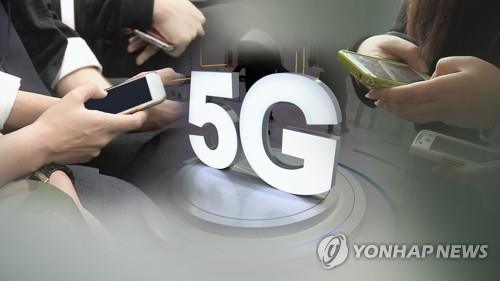South Korea 5G subscribers top 6 million at end of April 2020
More than 6 million South Koreans were subscribed to 5G mobile networks as of April, a year after the country adopted the service, according to government data reported Monday, June 1st. The number of 5G users in the nation reached 6.34 million as of the end of April, up 7.8 percent from a month earlier, according to the data compiled by the Ministry of Science and ICT.
South Korea’s three carriers — SK Telecom Co., KT Corp. and LG Uplus Corp. — rolled out the commercial 5G network last April and have aggressively promoted their new service for premium smartphones.

SK Telecom’s 5G customers accounted for 45 percent as of April, trailed by KT with 30.3 percent and LG Uplus with 24.7 percent, the ministry said.
The number of mobile subscribers between 2G and 5G came to 69.35 million as of the end of April, the ministry said.
In May, South Korean operator KT added 360,000 5G subscribers in the first quarter of the year, the telco said in its earnings statement. KT, which launched commercial 5G services in April 2019, ended Q1 with a total of 1.78 million 5G customers.
“Since the launch of KT’s 5G services, we are currently maintaining a much higher market share in 5G compared to the market share we have for the LTE handsets,” Kyung-Keun Yoon, KT’s CFO, said during a conference call with investors.
It’s important to note that Korea has its own version of IMT 2020 RIT/SRIT being progressed by ITU-R WP 5D. The country’s IMT 2020 submission is based on 3GPP Release 15 “5G NR.” It is not clear if there are any technical differences between Korea and 3GPP IMT 2020 submissions and if so, what they are.
References:
https://en.yna.co.kr/view/AEN20200601006000320
2 thoughts on “South Korea 5G subscribers top 6 million at end of April 2020”
Comments are closed.



SK Telecom (NYSE:SKM) today opened a new wave of TIP Ecosystem Acceleration Center (TEAC) program applications to develop new growth drivers through innovative 5G edge services to prepare for the post-COVID-19 era.
TIP Ecosystem Acceleration Center (TEAC, https://telecominfraproject.com/teac) is a global ecosystem that attracts both startups and investors to work together to achieve breakthroughs in the telecom industry. SK Telecom has been operating TEAC in Korea since 2017, while DT and BT are operating TEACs in Germany and the UK respectively.
The global spread of the COVID-19 pandemic is pushing the demand for non-face-to-face solutions –e.g. online learning, cloud games, online concerts, etc. – that require ultra-low latency enabled by 5G edge cloud. To accelerate its innovations in 5G and edge computing, the company invites aspiring startups with expertise in 5G edge services/infrastructure and non-face-to-face solutions.
Light Reading: 5G still a technology looking for a purpose
18 months into the commercial deployment of 5G, the returns are paltry.
The two big South Korean operators, SKT and KT, have if anything gone backwards. The latest filings reveal all the key financial data are flat or declining. Likewise the Chinese telcos.
Unlike early 3G or 4G, we can’t blame this on devices. China has around 100 different handsets available with some of the price bundles costing as little as 100 yuan ($15.11).
China has raced to around 200 million 5G “package” subscribers, which, even though it overstates the real total, points to how smoothly 5G deployment has gone compared with previous generations.
Yet for all that, it’s still a technology looking for a purpose. No wonder Chinese operators are selling it on price.
The non-progress of 5G is attracting some desperate commentary in China, where it’s seen as a matter of national pride, not to mention some $30 billion in sunk costs.
So far, 5G just hasn’t created any excitement. There are no game-changing new apps or devices. They will come eventually, just as the iPhone arrived to drive traffic onto 3G networks.
https://www.lightreading.com/asia/5g-still-technology-looking-for-purpose/d/d-id/765341?